Devastated by war, Iraq’s Christians hope the Pope’s first ever visit can bring change
Papal visit begins later this week with high expectations among the faithful but large security concerns for others, reports Bel Trew in Baghdad

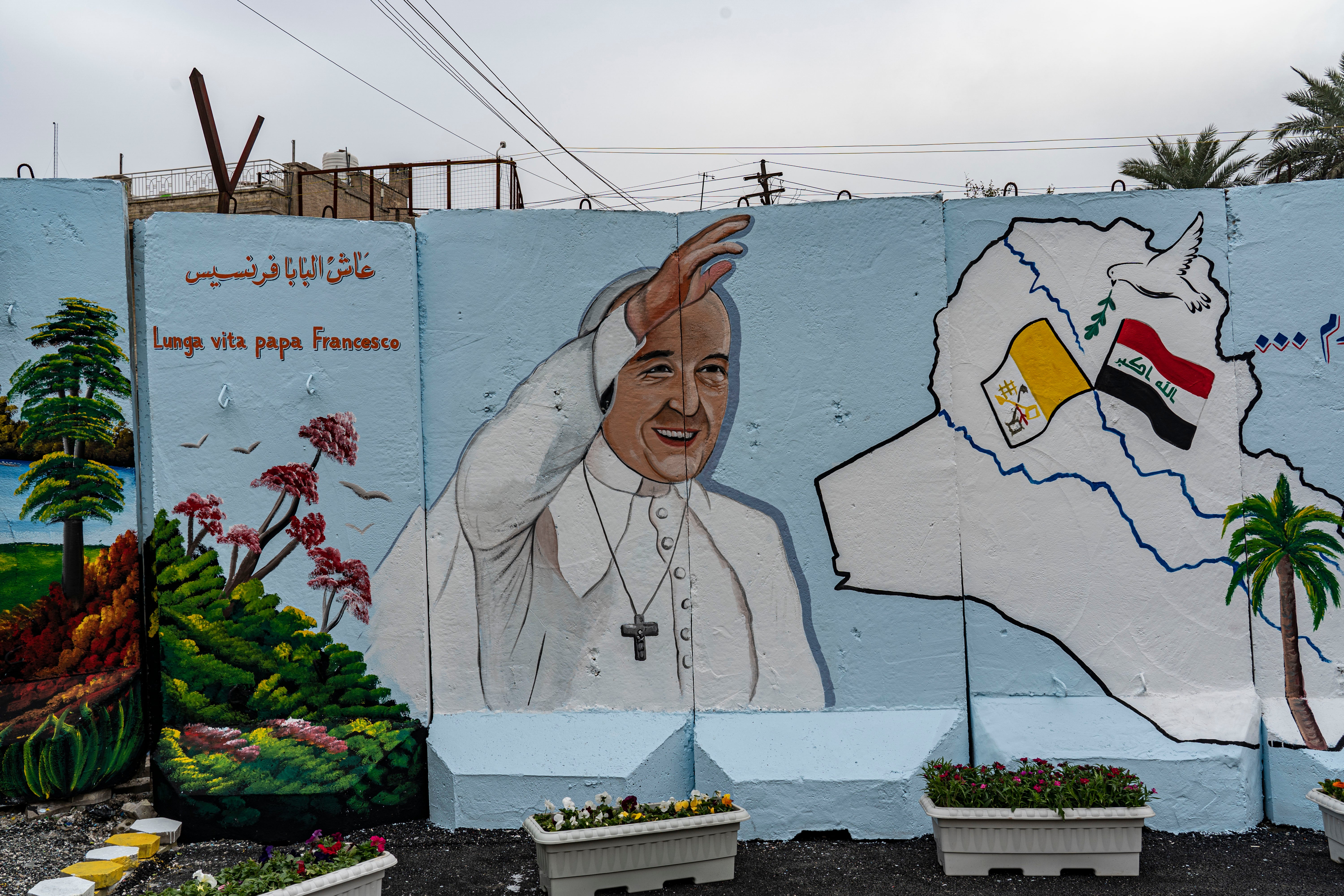
Just 200 metres away blocking the road in front of the Iraqi cleric, was a vision from everyone’s worst nightmare: a cluster of black-flagged pick up trucks with heavily-armed Islamic State-militants inside.
It was 6 August 2014 just outside Najeeb Michaeel’s hometown of Qaraqosh, in northern Iraq.
Michaeel, a Dominican friar who was later ordained as archbishop of nearby Mosul, heard of the encroaching Isis army and gathered together parishioners and neighbours to flee to safety. Among the belongings they were carrying with them was a trove of precious Christian manuscripts and books dating back to the 13th century rescued from the churches.
But amid the chaos, the convoy had somehow stumbled into a phalanx of Isis jihadists who were preparing to rampage the surrounding area.
“We saw their pickup trucks just 200 metres away from us. We were in a convoy of cars, we had families, we had nearly 1,000 manuscripts with us,” he says recalling what he refers to as “the black night”.
“But the peshmerga [Kurdish forces] were there and the shooting between the two sides started.
“The peshmerga opened a checkpoint and we had to abandon the cars and flee on foot to Kurdistan.”
Luckily, they did. Isis ravaged swathes of land in the area as they rolled out their caliphate. They burnt and looted homes, and destroyed or damaged every single church in Mosul. They kidnapped, enslaved, raped and killed those who had not managed to escape. They forced people to convert.
Tens of thousands of Christians fled. The cities, towns and villages still bear the scars of the senseless violence and bloodshed years after Isis was defeated and their caliphate crumbled.
But now, nearly seven years later, Archbishop Michaeel, who was nominated for an award by the European parliament for his actions on 6 August, is doing something which would have been unthinkable on that bloody night. He is preparing for the arrival of Pope Francis who lands in Iraq on Friday for a five-day visit, becoming the first Pope in history to do so.
In Mosul, he says they have successfully refurbished two churches in time for the historic visit, where the Pope is expected to lead prayers over the weekend.
“The visit means a great deal to this area which suffered a lot under Isis and even before,” Archbishop Michaeel tells The Independent. “The main message of the Pope’s visit is very important, Mosul and other areas need to be reborn and rebuilt again. Not just by stone but by spirit as well.”
The archbishop says they are trying to encourage people to come back to their homes in Mosul after the presence of Christians in the city was nearly eradicated.
According to the cleric only around 60 Christian families have returned to the city, which before Isis was home to some 6,000 families.
Half the 90,000 Christians who used to live in the nearby Nineveh Plains have also still not returned, according to the Assyrian Policy Institute.
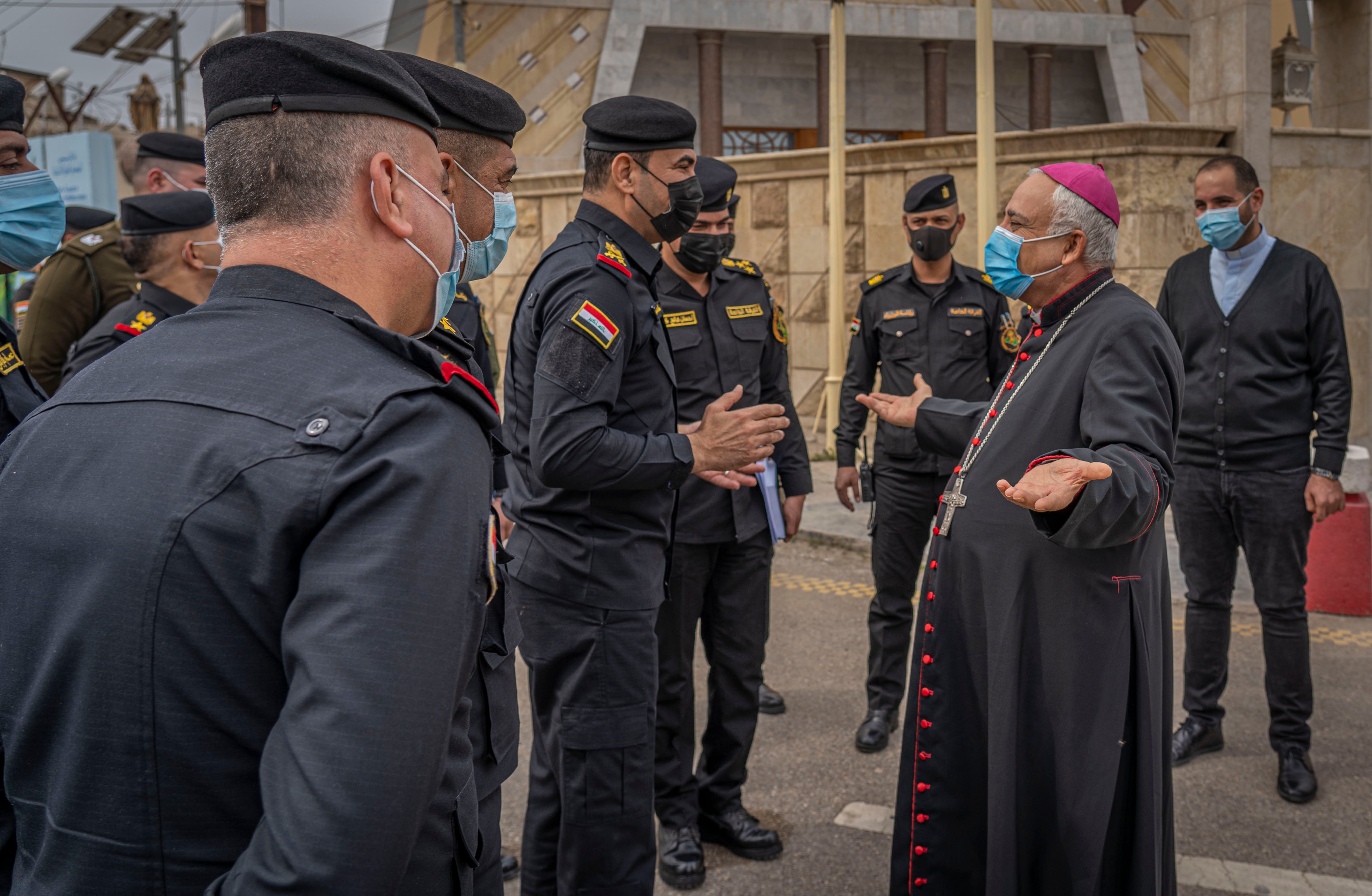
“Most people can’t come back as they don’t have houses because they were destroyed or burnt,” he says.
“We need help from the international community.”
The 5-8 March papal visit comes at a tumultuous time for Iraq. There has been a slew of recent attacks including a twin suicide bombing in Baghdad which killed at least 32 people in January, which the Pope condemned. Last Monday, rockets once again hit Baghdad’s fortified Green Zone, which hosts government buildings and foreign embassies. There were no casualties.
But it followed a deadly rocket barrage on an airbase in Erbil last month.
A senior member of the Iraqi security forces told The Independent there would be heightened security across all the locations the Pope would be visiting but declined to give details as it might compromise the plan.
However Archbishop Bashar Warda of Erbil says an additional 10,000 personnel are being deployed for that purpose.
There was already heightened security in Baghdad with additional checkpoints set up across the capital during a 24-hour coronavirus curfew in place the weekend before the visit. Another curfew will be in place the weekend of the visit due to rising virus cases.
Members of the papal entourage have all been vaccinated amid the risk. It will be Pope Francis’ first outside Italy since November 2019, when he visited Thailand and Japan. Four trips planned for 2020 were cancelled because of the pandemic – making the trip to Iraq even more crucial to Christians within the country.
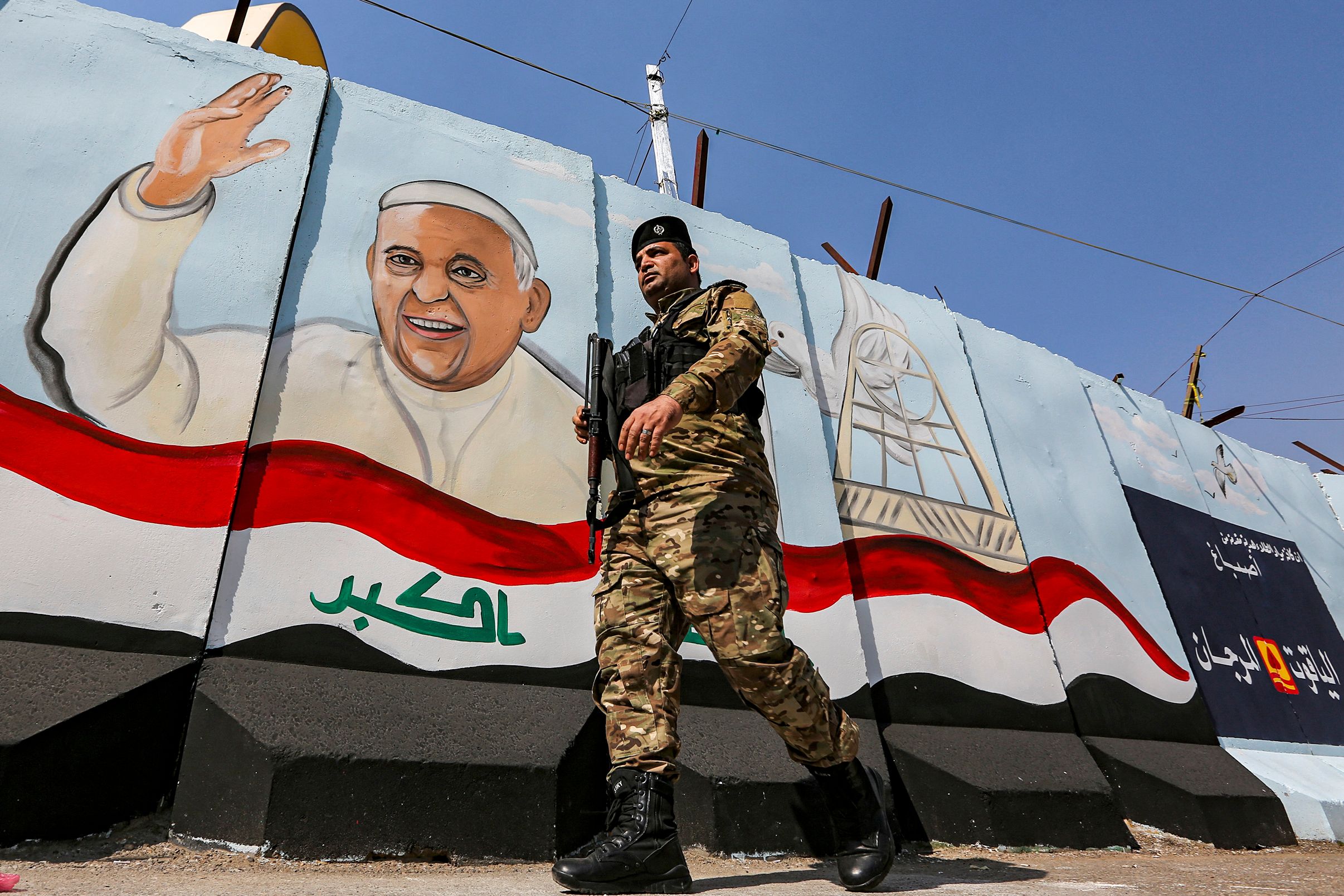
Christianity in Iraq is among the oldest churches in the world, but after years of being attacked by militants, al-Qaeda-linked groups, then Isis and most recently militias and gangs, it was pushed to the point of near extinction in some areas.
The falling numbers are stark. Before the 2003 US-led invasion of Iraq and the fall of Saddam Hussein, there were over a million Christians in Iraq, according to NGO Minority Rights Group (MRG). Recent figures suggest that just over 200,000 remain.
They are marginalised politically and economically and many say they have little faith the government can protect or look after them.
According to MRG’s Iraq researcher Max Joseph, security threats and land theft are still the main issues facing Christians across the country. He also says they are not considered equal citizens both constitutionally and in practice.
For example, in the Iraqi capital of Baghdad, there has been a worrying recent rise in attacks on liquor stores that are traditionally run by Christians, with some recently being firebombed.
“Hate speech rhetoric targeting Christians and other minorities is still a problem – these are people who are ‘othered’ in their own homeland in political discourse and the media, and this creates an atmosphere of impunity for crimes against them,” he tells The Independent.
“We’re talking about a people who have endured not only one genocide in the past century, but several, and have never tasted any justice by way of recognition locally or internationally, never mind reparation.”
“I only hope that the people who remain can know what hope feels like once more.”
And so a lot is riding on the visit by the Pope. Many in the community hope it will cast a helpful spotlight on Christians and other minorities in Iraq, and not just a public relations exercise for those in power.
They hope it will translate into real change on the ground particularly as he meets with figures from across Iraq’s religious and political spectrum.
The Pope is due to meet the country’s political rulers but also Iraq’s top Shia cleric, grand ayatollah Ali al-Sistani in Najaf. On Saturday he will fly to Nasiriya in the south for an inter-religious meeting at the ancient Mesopotamian site of Ur.
He will start his trip in Baghdad meeting Christian clerics of all denominations at the capital’s main Catholic cathedral Sayidat al-Nejat (Our Lady of Salvation).
Now encased in the concrete ribcage of blast walls, the cathedral was the site of one of the bloodiest attacks on Iraq’s Christians before the rise of Isis. In 2010, half a dozen al-Qaeda-linked suicide bombers blew themselves up – killing 58 people in total.
Photos of those killed that day flank the front of the church as a grim reminder. This week, though, the blast walls have been brightened up with murals of the Pope as well as Vatican and Iraqi flags. Inside the kaleidoscopic nave, staff busily polish pews and lighting fixtures.
There, Father Paul, 35, a priest at the church, speaks of his own family’s close escape from Isis also in Qaraqosh, where they left with just minutes to spare before militants rolled into the city.
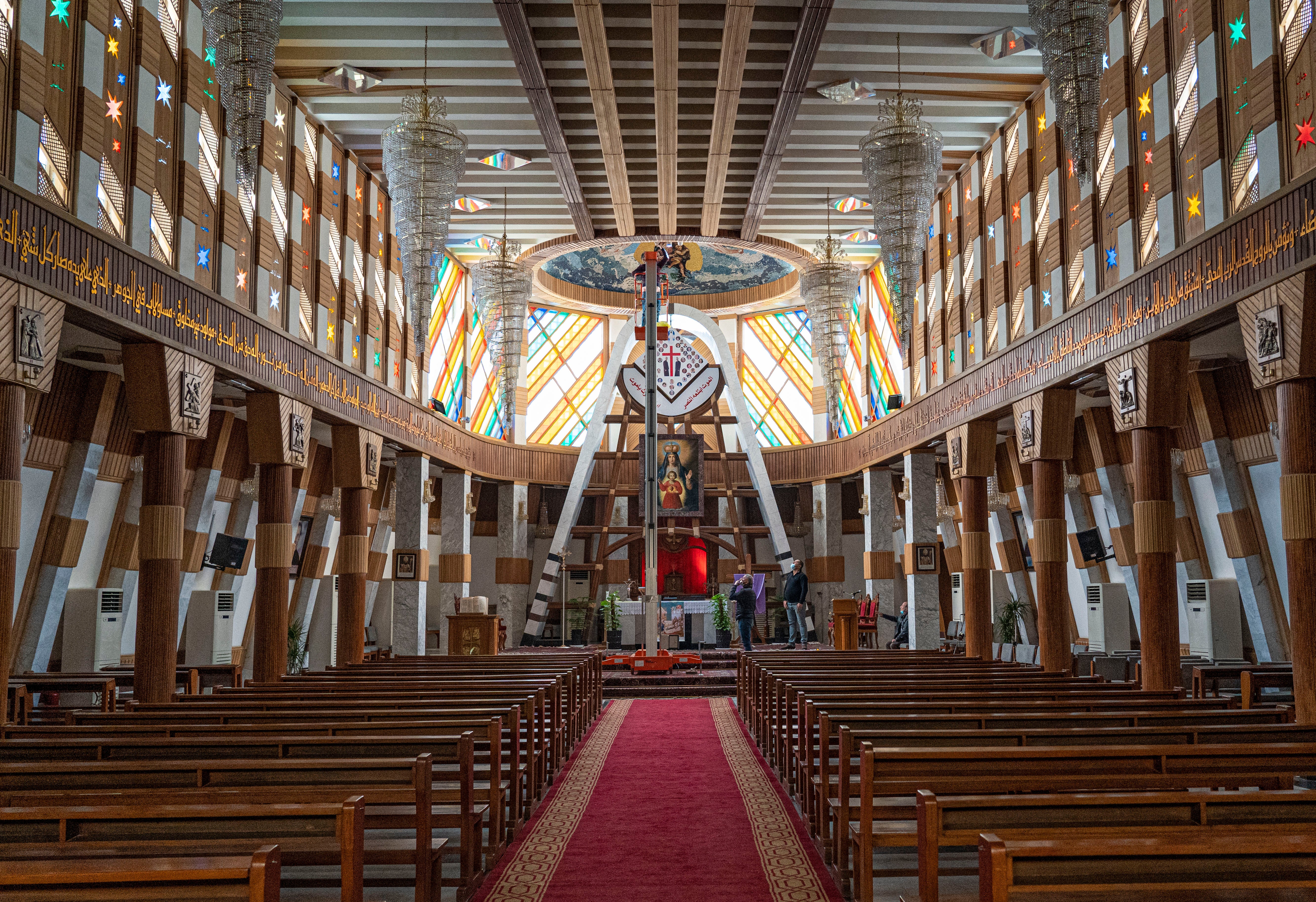
Nearly seven years on, the family has not returned to Qaraqosh and like tens of thousands of Iraq’s Christians have resettled abroad.
Father Paul has stayed in Baghdad but fears many more from the community like his family who fled will decide not to return home because of the difficulties Christians face.
“Right now here I am inside the concrete walls, but the people outside are not secure,” he says of the surrounding and dwindling Christian community in the Baghdad neighbourhood.
“We have suffered enough, I hope the situation will improve because this is our home too,” he adds.
Across town in the Joseph Chaldean cathedral where the Pope will celebrate mass on Saturday night, the entire street is getting a makeover including the building of a new road.
There, Father Nadir Dakov says the visit could be the “light at the end of the tunnel” for his parishioners but also other vulnerable minorities in Iraq. He hopes the high-profile trip might encourage the authorities to enshrine better protections of religious freedoms and rights in the country’s laws.
“Christians are the symbol of minorities in Iraq. But they have the church which is a voice for the voiceless,” he says.
“Most of the other groups, like the Yazidis, have no one to represent them. And so we hope this visit will help.”
“We look at the Pope’s visit as a light of salvation for all minorities.”



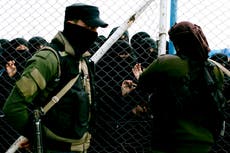
Join our commenting forum
Join thought-provoking conversations, follow other Independent readers and see their replies
Comments